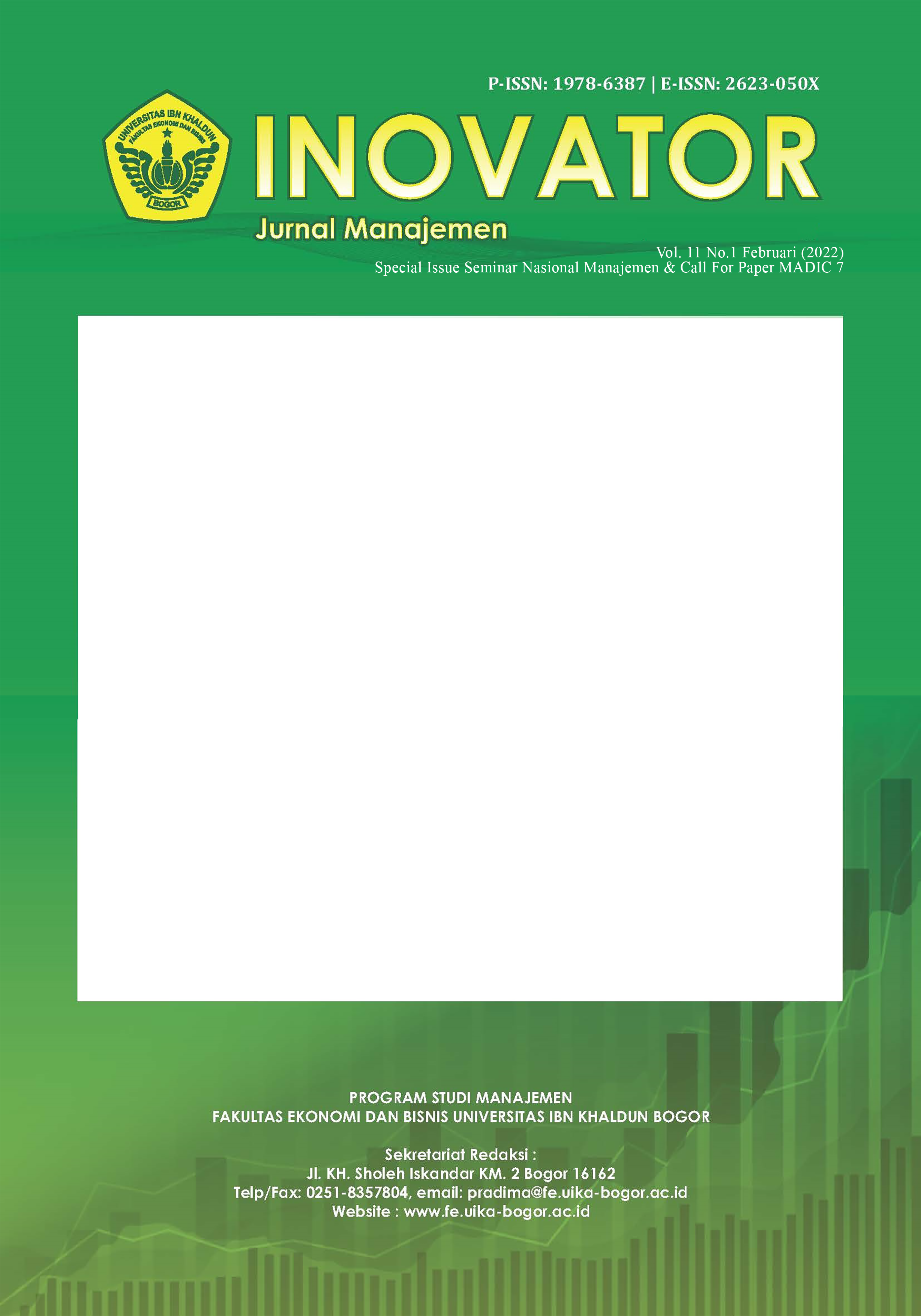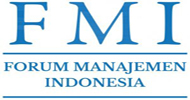Enhancing Islamic Job Satisfaction in the Midst of Pandemic Era: The Role of Leadership
DOI:
https://doi.org/10.32832/inovator.v11i1.6853Keywords:
Islamic job satisfaction, pandemic, transformational leadership, transactional leadershipAbstract
Job satisfaction has been the foundation for the effectiveness of an organization since it can affect the quality of work of employees. Satisfied employees are the evidence that the organization has appreciated their works. Given this fact, however, little research has been done on employee Islamic job satisfaction. Thereby, this study aims to examine and analyze the Islamic job satisfaction of employees and the factors that influence it, which is leadership. The method used in this research is quantitative. Data were collected from 80 respondents. The results of the analysis show that transformational leadership has an effect on Islamic job satisfaction, while transactional leadership is in on the contraryReferences
Al-Ghazali, Imam Abu Hamid Muhamed Bin Muhammad. (2001). Kimiya' Al-Sa'adah Kimia Ruhani untuk Kebahagiaan Abadi, Ter. Dedi Slamet Riyadi, Fauzi Bahreisy. Jakarta: Zaman.
Adha, S., Wandi, D., & Susanto, Y. (2019). Pengaruh Kepuasan Kerja Terhadap Kinerja Pegawai pada Dinas Perindustrian, Perdagangan dan ESDM Kabupaten Pandeglang. Jurnal Ekonomi Vokasi, 2(1).
Anoraga, Pandji. (2003). Psikologi Kepemimpinan. Jakarta: Rineka Cipta.
Arianto, Nurmin. (2018) Pengaruh Kepemimpinan Terhadap Kinerja dan Kepuasan Kerja Karyawan Pada PT. Gada Rajawali Dunia, Jurnal Ilmiah, Manajemen Sumber Daya Manusia, 1(3).
Bass, B. M. & Avolio, B. J. (2000). Multifactor leadership questionnaire: Manual leader form, rater, and scoring key for MLQ (Form 5x-Short). Redwood City, CA: Mind Garden.
Burhanudin, A. K. (2020). Gaya Kepemimpinan Transaksional dan Transformasional Terhadap Kinerja Karyawan Bank BRI Purworejo. Jurnal Ilmiah Manajemen, 1(1).
Colquitt, A. Jason et al. (2015). Organizational Behavior: Improving Performance and Commitment in the Workplace. New York: Mc Graw Hill.
Emanuel, Boahen Adu & EsterFlorance Akonor. (2017). Factors Affecting Employee Job Satisfaction in Private Universities in Sub-Saharan Africa: The Case of Ghana. Journal of Economics, Management and Trade, 18(4).
Harahap, Suryani Dewi & Hazmanan Khair. (2019). Pengaruh Kepemimpinan Dan Kompensasi Terhadap Kepuasan Kerja Melalui Motivasi Kerja. Jurnal Ilmiah Magister Manajemen, 2(1).
Ilahi, Dede Kurnia, Mochamad Djudi Mukzam, & Arik Prasetyo. (2017). Pengaruh Kepuasan Kerja Terhadap Disiplin Kerja dan Komitmen Organisasional (Studi Pada Karyawan PT.PLN (Persero) Distribusi Jawa Timur Area Malang), Jurnal Administrasi Bisnis, 44(1).
Inuwa, Mohammed. (2016). Job Satisfaction and Employee Performance: An Approach. The Millenium University Journal, 1(1).
Kebede, Muleta Alemu, & Getnet Worku Demeke. (2017). The Influence of Leadership Styles on Employees' Job Satisfaction in Ethiopian Public Universities. Contemporary Management Research, 13(3).
Khan, Ahmed Zakeer, Allah Nawaz, & Irfanullah Khan. (2016). Leadership Theories and Styles: A Literature Review. Journal of Resources Development and Management, 16.
Kartini, Kartono. (2008). Pemimpin dan Kepemipinan. Jakarta: Raja Grafindo Persada.
Ling, Voon Mung, Ngui Kwang Sung, and May Cuin Lo. (2011). The Influence of Leadership Styles on Employees' Job Satisfaction in Public Sector Organizations in Malaysia. International Journal of Business, Management and Social Sciences. 2(1).
Lok, P. & Crawford, J. (2004). The Effect of Organizational Culture and Leadership Style on Job Satisfaction and Organizational Commitment: A Cross-National Comparison. Journal of Management Development. 23(4).
Mohamad, B., Saad, H. S. M., and Ismail, S. H. S. (2014). The Role of Integrity as a Mediator between Work Satisfaction and Work Performance in The Perspective of Islam: An Empirical Approach using SEM/AMOS Model. International Journal of Research in Applied, Natural and Social Sciences, 2(1), 71-84.
Onyebuchi, Obiekwe, Obibhunun Lucky & Omah Okechukwu. (2019). Impact of Employee Job Satisfaction on Organizational Performance. Academic Journal of Current Research, 6(12).
Prasetyo, Ery Teguh, & Puspa Marlina. (2019). Pengaruh Disiplin Kerja Terhadap Kinerja Karyawan, Jurnal Inspirasi Bisnis dan Manajemen, 3(1).
Roni, Faizal. (2019). Gaya Kepemimpinan Transformasional dan Transaksional serta Dampaknya terhadap Kepuasan Kerja Karyawan. Jurnal Sekertari dan Manajemen, 3(1).
Robins, P. Stephen. (2016). Perilaku Organisasi. Jakarta: Salemba Empat.
Robbins, P. Stephen & Judge, A. Timothy. (2013). Organizational Behavior. New Jersey: Prentice Hall.
Soleman, M., Armanu, A., Aisjah, S., & Sudjatno, S. (2020). Islamic job satisfaction, organizational commitment, and intention to leave: Moderating role of Islamic work ethics. Management Science Letters, 10(6), 1359-1368.
Suarga. (2017). Efektivitas Penerapan Prinsip-Prinsip Kepemimpinan Kepala Sekolah terhadap Peningkatan Mutu Layanan Administrasi Pendidikan. Jurnal Idarah, 1(1).
Suryani, Lilis. (2018). Pengaruh Gaya Kepemimpinan Transaksional dan Gaya Kepemimpinan Transformasional Terhadap Kepuasan Kerja Karyawan Pada PT Jasaraharja Putera. Jurnal Semarak, 10(2).









